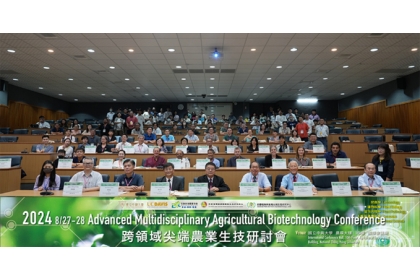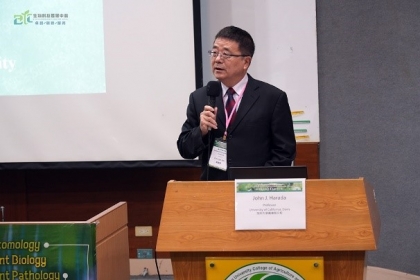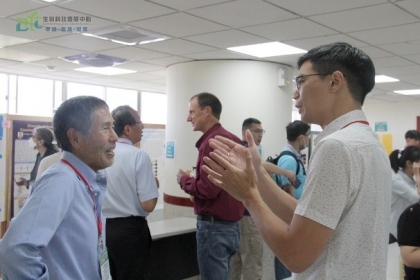Taiwan-U.S. Agricultural Flagship Institutions Reignite Bilateral Cooperation Symposium to Advance Domestic Agricultural Technology
2024-09-02
興新聞張貼者
Unit秘書室
1,880
Source:NCHU Biotechnology Center
The Advanced Multidisciplinary Agricultural Biotechnology Conference was held at National Chung Hsing University (NCHU) on August 27-28, organized by the university's Biotechnology Center. The event brought together distinguished scholars from the University of California, Davis (UC Davis) and Taiwan to discuss key issues such as plant sciences, pest management, and animal health, while also sharing the latest research findings. The conference aimed to foster international cooperation and accelerate innovation and development in agricultural biotechnology, attracting 250 experts and scholars. A student poster competition was also held, with 68 participants.
As global leaders in agricultural technology, NCHU and UC Davis have maintained a deep cooperative relationship in agricultural research, education, and technology extension for over 30 years, supported by the Ministry of Education's Higher Education Sprout Project. Moving forward, the two universities will continue to jointly promote advancements in agricultural technology, biotechnology, and veterinary science.
In the face of global agricultural challenges such as climate change, limited resources, and pest threats, innovation in agricultural technology has become a focal point for countries worldwide. In his keynote speech, the renowned American scholar Professor Harada provided an in-depth analysis of the cellular structure and genetic regulation of seed development and their profound impact on crop improvement. Professor Kumar discussed "Plant Immune Signaling," offering the latest research on combating plant diseases. Professor Beckles focused on post-harvest technology, sharing her research on the ripening and aging processes of tomatoes, particularly the effects of cold storage on extending shelf life and reducing waste. Professor Hui-Ling Lin from NCHU’s Department of Horticulture explored methods to maintain the freshness of guava during long-distance transportation, which has practical applications for enhancing the international competitiveness of agricultural products. Professor Wen-Bin Yeh, Director of the Department of Entomology, utilized DNA microarray technology and ITS2 sequence-specific probes for the identification of agricultural bark beetles, contributing to more efficient pest monitoring and management. Additionally, Professor Day-Yu Chao from the Graduate Institute of Microbiology and Public Health proposed a new strategy to disrupt the cross-species transmission cycle of the avian influenza virus, with practical applications for improving epidemic control measures.
The conference also addressed the global issue of "One Health," with Professor Chomel from the French Academy of Medicine emphasizing the close connections between human, animal, and ecosystem health in his speech. He reviewed the historical evolution from integrated medicine in ancient China to modern comparative medicine, highlighting the central role of cross-disciplinary collaboration in global public health, particularly in disease prevention and control. In addition, the participating scholars engaged in in-depth discussions on important topics such as animal behavior and welfare, as well as avian conservation, underscoring the importance of interdisciplinary cooperation in solving complex agricultural problems.
The conference was meticulously organized by NCHU's Biotechnology Center. It was led by NCHU President Professor Fuh-Jyh Jan, with participation from Vice Presidents Professor Chuan-Mu Chen and Professor Chao-Ching Chang, Deans Professor Chih-Feng Chen and Professor Der-Hsin Chen, Academician Shyi-Dong Yeh from Academia Sinica, Professor Su-May Yu, and Professor Chang-Hsien Yang, who also served as session chairs.
President Professor Fuh-Jyh Jan noted that with the easing of the global pandemic, this year’s bilateral academic exchange activities have expanded from individual visits to a larger-scale conference, aiming to facilitate more collaboration and discussion among researchers, advance key technologies in the domestic agricultural biotechnology field, and contribute positively to achieving the United Nations' 2030 Sustainable Development Goals.
Professor Ming-Hon Hou, Director of the Biotechnology Center, pointed out that the conference not only deepened academic exchanges between Taiwan and the U.S. but also created more opportunities for future international collaboration. Looking ahead, NCHU will continue to promote bilateral academic and technological exchanges, cultivating agricultural technology professionals with global perspectives and innovative abilities, thereby advancing Taiwan's leadership position in the international agricultural biotechnology field.
The Advanced Multidisciplinary Agricultural Biotechnology Conference was held at National Chung Hsing University (NCHU) on August 27-28, organized by the university's Biotechnology Center. The event brought together distinguished scholars from the University of California, Davis (UC Davis) and Taiwan to discuss key issues such as plant sciences, pest management, and animal health, while also sharing the latest research findings. The conference aimed to foster international cooperation and accelerate innovation and development in agricultural biotechnology, attracting 250 experts and scholars. A student poster competition was also held, with 68 participants.
As global leaders in agricultural technology, NCHU and UC Davis have maintained a deep cooperative relationship in agricultural research, education, and technology extension for over 30 years, supported by the Ministry of Education's Higher Education Sprout Project. Moving forward, the two universities will continue to jointly promote advancements in agricultural technology, biotechnology, and veterinary science.
In the face of global agricultural challenges such as climate change, limited resources, and pest threats, innovation in agricultural technology has become a focal point for countries worldwide. In his keynote speech, the renowned American scholar Professor Harada provided an in-depth analysis of the cellular structure and genetic regulation of seed development and their profound impact on crop improvement. Professor Kumar discussed "Plant Immune Signaling," offering the latest research on combating plant diseases. Professor Beckles focused on post-harvest technology, sharing her research on the ripening and aging processes of tomatoes, particularly the effects of cold storage on extending shelf life and reducing waste. Professor Hui-Ling Lin from NCHU’s Department of Horticulture explored methods to maintain the freshness of guava during long-distance transportation, which has practical applications for enhancing the international competitiveness of agricultural products. Professor Wen-Bin Yeh, Director of the Department of Entomology, utilized DNA microarray technology and ITS2 sequence-specific probes for the identification of agricultural bark beetles, contributing to more efficient pest monitoring and management. Additionally, Professor Day-Yu Chao from the Graduate Institute of Microbiology and Public Health proposed a new strategy to disrupt the cross-species transmission cycle of the avian influenza virus, with practical applications for improving epidemic control measures.
The conference also addressed the global issue of "One Health," with Professor Chomel from the French Academy of Medicine emphasizing the close connections between human, animal, and ecosystem health in his speech. He reviewed the historical evolution from integrated medicine in ancient China to modern comparative medicine, highlighting the central role of cross-disciplinary collaboration in global public health, particularly in disease prevention and control. In addition, the participating scholars engaged in in-depth discussions on important topics such as animal behavior and welfare, as well as avian conservation, underscoring the importance of interdisciplinary cooperation in solving complex agricultural problems.
The conference was meticulously organized by NCHU's Biotechnology Center. It was led by NCHU President Professor Fuh-Jyh Jan, with participation from Vice Presidents Professor Chuan-Mu Chen and Professor Chao-Ching Chang, Deans Professor Chih-Feng Chen and Professor Der-Hsin Chen, Academician Shyi-Dong Yeh from Academia Sinica, Professor Su-May Yu, and Professor Chang-Hsien Yang, who also served as session chairs.
President Professor Fuh-Jyh Jan noted that with the easing of the global pandemic, this year’s bilateral academic exchange activities have expanded from individual visits to a larger-scale conference, aiming to facilitate more collaboration and discussion among researchers, advance key technologies in the domestic agricultural biotechnology field, and contribute positively to achieving the United Nations' 2030 Sustainable Development Goals.
Professor Ming-Hon Hou, Director of the Biotechnology Center, pointed out that the conference not only deepened academic exchanges between Taiwan and the U.S. but also created more opportunities for future international collaboration. Looking ahead, NCHU will continue to promote bilateral academic and technological exchanges, cultivating agricultural technology professionals with global perspectives and innovative abilities, thereby advancing Taiwan's leadership position in the international agricultural biotechnology field.




